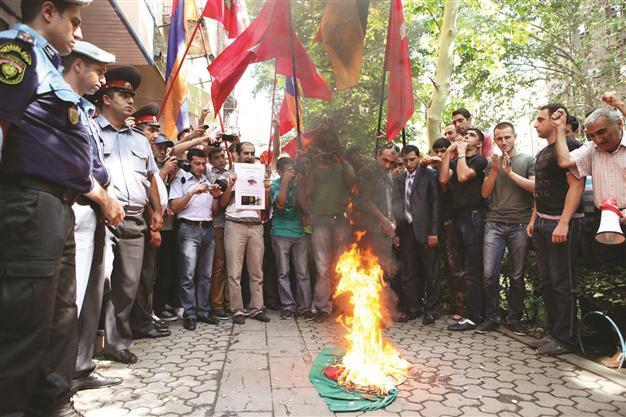Baku’s presidential pardon adds to Caucasus tensions
YEREVAN / BAKU

EPA Photo
Tension between Azerbaijan and Armenia has reached new heights after the Hungarian government sent a soldier who murdered an Armenian back to his native Azerbaijan, where he was pardoned.
Hundreds of people have since taken part in protests outside the Hungarian consulate in the Armenian capital, Yerevan. Angry demonstrators burned the Hungarian flag on Sept. 1 and threw eggs, tomatoes and coins, accusing Budapest of doing a deal with Baku in order to profit from Azerbaijan’s energy riches.
Yerevan cut diplomatic ties with Hungary on Aug. 31. Armenian President Serzh Sargsyan said Hungary had made a “grave mistake” in extraditing the killer, who hacked his victim to death with an axe in Budapest in 2004. Armenia also vowed to protest the presidential pardon in a letter to the states that co-chair the Organization for Security and Cooperation in Europe (OSCE) Minsk Group. U.S. President Barack Obama said he was “deeply concerned” about the pardon.
Azerbaijani lieutenant Ramil Safarov was jailed for life after hacking Armenian officer Gurgen Markarian to death at a military academy in Budapest, where the servicemen were attending English-language courses organized by NATO. Safarov claimed that Markarian had insulted Azerbaijan. The two fought a bitter war over the disputed region of Nagorno-Karabakh in the 1990s, and tension between them has been high ever since.
The conflict left some 30,000 people dead and displaced hundreds of thousands. The two sides have not signed a final peace deal since the 1994 cease-fire, and there are still regular firefights along the Karabakh frontline. Hungary insists that Azerbaijan promised that the soldier would serve out the remainder of his sentence after his return home and would not be freed.
The Armenian and Azerbaijani foreign ministers were scheduled to meet yesterday with the OSCE co-chairs in Paris, where the issue is likely to be on the agenda. It was also expected to come up during the visit of NATO Secretary-General Anders Fogh Rasmussen to the region this week.
Promotion to majorIn another move that infuriated Armenia, Azerbaijan has reinstated Safarov to the army and promoted him to the rank of major. “Defense Minister Safar Abiyev received him, handed him his new rank and wished him success in his future military service,” a Defense Ministry statement said. The Ministry also awarded Safarov over eight years’ worth of salary for the time he spent in a Hungarian prison, and gifted him with an apartment. Armenian Justice Minister Hrayr Tovmasyan wrote a letter to his Hungarian counterpart to express his indignation at the extradition.
“I am certain that you should have known what would happen with Safarov in Azerbaijan. You should have known that you were transferring a person who had committed a murder based on the motive of racial hostility, to a country where he is considered a hero. You must have known that this would be a slap, first of all to the justice of Hungary, and generally to the whole European value system,” wrote Tovmasyan, according to News.am website. “I would have resigned in your place as a minister,” wrote Tovmasyan.
Message from Diaspora MinistryArmenia’s Diaspora Ministry also called upon the Armenians all over the world to commence demonstrations in connection with the extradition. Commenting on Safarov’s extradition, Azerbaijani lawmaker Ganira Pashayeva said: “this is a great event not only for Azerbaijanis living in Azerbaijan, but also for the whole Turkish people living both inside and outside Azerbaijan,” according to News.az website. Another Azerbaijani lawmaker, Zahid Oruj, who was directly involved in securing Safarov’s extradition, also defended the decision. “Safarov’s action was not an ordinary criminal case. It was an adequate action against an Armenian who trampled the Azerbaijani flag before the eyes of a man who has lost his land, and whose relatives and friends were killed in front of his eyes,” Oruj said. “Safarov became a kind of symbol. His release will raise the moral and psychological mood of the society.”
Azerbaijan also hit back at U.S. criticism, insisting that the pardon, awarded to Safarov after he had served eight years of his sentence, conformed to a European legal convention on extradition.
